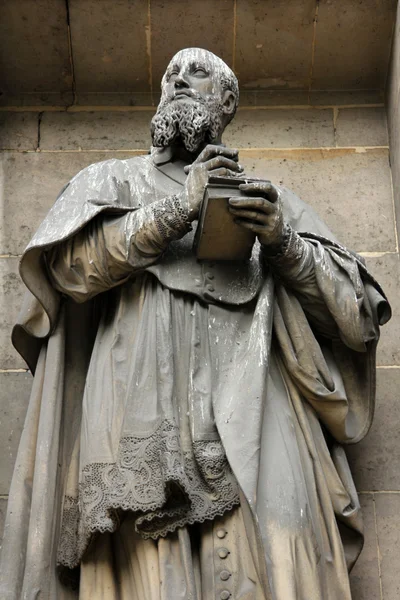
December 28 of this year marks the 400th anniversary of the death of St. Francis de Sales the "Saint of Meekness and Doctor of Charity." Saint John Bosco in the 19th century, made a vow at the time of his priestly ordination that "Salesian charity and gentleness will be my guide." He was a follower of St. Francis de Sales and this simple spirituality of kindness was the reason the community he established was called the Society of St, Francis de Sales in his honor in 1859 dedicated to the education of youth (Salesians).
The director of a Theological Institute in the Eyes of the Believer Column of The Catholic Times introduces us to the spirituality of St. Francis de Sales. She feels that the saint's spirituality is not well known among our present-day Catholics.
Many laymen, from aristocrats to the poor, approached the Bishop de Sales for spiritual guidance, he led them to respond to God's Spirit by asking: "You can do that can't you?" rather than instructing them to act in a certain way. He was leading them to respond to the Holy Spirit in their way.
Among the books he wrote is: "Introduction to the Devout Life" which was edited by collecting spiritual guidance letters written to the one who loves God. It was one of the first books written for lay spirituality and is still read as a classic. This book respects the unique life and calling of lay people living in the world, breaking away from the long-standing conventional wisdom about Christian spirituality and perfection.
The saint viewed the world and human nature created by God with love, emphasizing that just as the gifts of the Holy Spirit vary (see 1 Cor 12:1-11), each person bears the fruit of their devotion according to their position and office in life. In the Introduction to the Devout Life, he says that it is foolish for the laity to shut themselves up in the church, not to take care of their families, and not to work. The spirituality of the laity suggests that it is more important to strive to build on the virtues such as patience, kindness, humility, poverty, chastity, and gentleness in daily life rather than excessive fasting or penance. Among the virtues, 'humility', which leads to a life pleasing to God, and 'meekness', which leads to a life pleasing to one's neighbor, are the 'double commandment of love (refer to Matthew 22:37-40) to love God and one's neighbor.
He taught that 'charity' is when we try to live the virtues with God-given love, and when we do well naturally and frequently in our daily lives with that charity, this natural act is 'piety'. In other words, the devout life he thinks goes beyond prayers for inner sanctification and pious acts but continues in the practice of loving God and neighbor in daily life. He emulated Jesus' humility' and 'meekness' and emphasized the spirituality of practicing 'Vive Jésus' in everyday life.
For this practical devotional life, the saint explains the prayer method of meditating on the life of Jesus. Emphasis was placed on training. In addition, even if it is not a specific 'space' of a church, he recommended we build a small church in our hearts in the middle of our daily lives and have a 'time' of holy spiritual seclusion where we stop for a while to reflect and remain in God’s love. And when this kind of reflection and meditation is over, he urges us to go back to our daily life and constantly reflect on our resolution and its practice.
In
this final week of waiting for Christmas, light all four Advent candles
and take a moment of spiritual seclusion recommended by the saint. To
her who hopes and resolves to deeply feel the love of God who is with us
always, she wants to become a humble and meek Jesus, the Salesian saint
seems to be quietly whispering to her not to stop talking but to act
the talk.
No comments:
Post a Comment